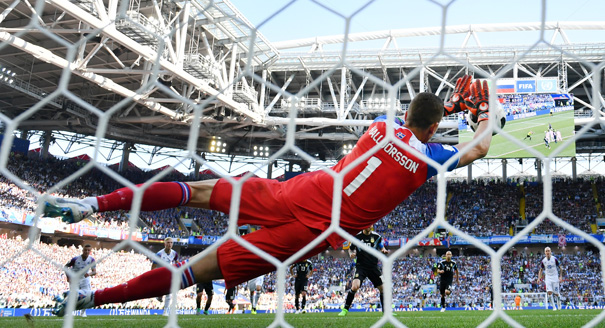Danyel Reiche is an associate professor of comparative politics at the American University of Beirut. He writes mainly about sports and politics, and is the author of Success and Failure of Countries at the Olympic Games, published in 2016 by Routledge. Diwan talked with Reiche in late June, during the football World Cup, to get his perspective on one of the top sporting events globally, and in particular how the Middle East has played into it.
Ghida Tayara: Has anything in the 2018 World Cup caught your eye?
Danyel Reiche: Political disputes from the Middle East have made it into the World Cup. Israeli Defense Minister Avigdor Lieberman claimed that Argentinean striker Lionel Messi missed his penalty against Iceland because Argentina cancelled its last friendly match with Israel right before the World Cup. Messi could have used the practice from that match, Lieberman said. I doubt there was any correlation, and I believe it was the right decision by Argentina to cancel the match after Israel had moved the venue from Haifa to Jerusalem, so that the match could be staged in the context of Israel’s 70th anniversary celebrations. Israel tried to politicize the match and failed.
Another interesting issue was the World Cup opening match between Russia and Saudi Arabia. During the game, Qatar Airways advertisements appeared on the perimeter board in the stadium. Clearly a goal for Qatar in the context of the conflict with Saudi Arabia and a humiliation for the Saudis. The blocking of Qatar’s BeIN Sports channel in Saudi-Arabia and the United Arab Emirates and the launch of a most likely state-sponsored pirate channel was another escalation in a dispute that has already lasted for more than a year now.
Finally, what I personally like most about the World Cup so far has been the Iranian women supporting their team, thereby making a strong statement against the ban on female spectators at domestic football matches.
GT: Are we bound to see more egalitarian World Cup tournaments than in the past?
DR: There is a tendency for the best players around the world to play in the top five European leagues—England, France, Germany, Italy, and Spain. This has closed the gap between players from most countries. However, those teams from less established footballing countries that have mainly fielded players from domestic leagues, such as Saudi Arabia, have had difficulties in being competitive.
GT: How has past corruption in FIFA affected world football, or has it?
DR:. There has been a shift from the West to the East in the economy of the World Cup. In light of the corruption scandals, traditional sponsors from the West have pulled out, to be replaced by sponsors from Russia, China, and Qatar. It was symbolic that during the opening match the FIFA president, Giovanni Infantino, was sitting between Russian President Vladimir Putin and Saudi Crown Prince Mohammed bin Salman, even if this was because the match was between Russia and Saudi Arabia. However, there were few other heads of states present in the stadium.
GT: The next World Cup is in Qatar. What potential pitfalls do you see in that tournament?
DR: The 2022 World Cup in Qatar will happen, although not everybody might like that. Qatar has been using sports strategically as a foreign policy tool that contributes to national security and allows the country to gain soft power. Qatar was clever to transfer the Brazilian player Neymar Jr. to the Qatar-owned Paris Saint-Germain right after the start of the diplomatic crisis in the Gulf, in order to change the conversation about Qatar in the global media. However, Qatar will only achieve its foreign policy goals if it meets the expectations of Western countries to reform the country, particularly when it comes to improving the living and working conditions of migrant workers.
Another issue is that there might be some tensions in the Arab world in case Israel qualifies for the 2022 World Cup, although that is not likely. Qatar assured FIFA in its bid for hosting the World Cup, that Israel would be welcome if it qualified. This was a credible assurance given that Israeli athletes have competed in sporting events in Qatar, for example in the World Swimming Championships in Doha.
GT: When will an Asian, Middle Eastern, or African country win the World Cup?
DR: So far, those African and Middle Eastern countries that are competitive are comprised of second- or third-generation emigrants to Europe. This was the case of Algeria in 2014, which almost won with its squad of diaspora players against Germany in the knockout stage. In reality, it was a team of French players with parents or grandparents from Algeria. The challenge all over the Middle East is to develop home-grown players. The naturalization of more talented foreign players is also a widespread policy tool, particularly in the Gulf. It is questionable to what extent this contributes to the development of local players. Middle Eastern and African countries need to start to believe in their own people and promote them.






